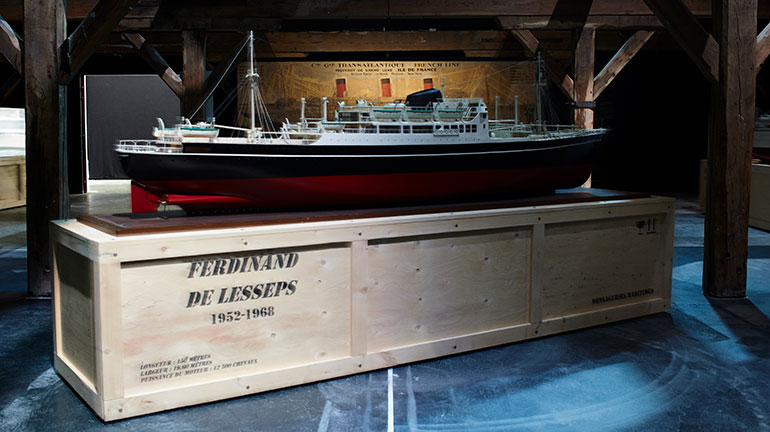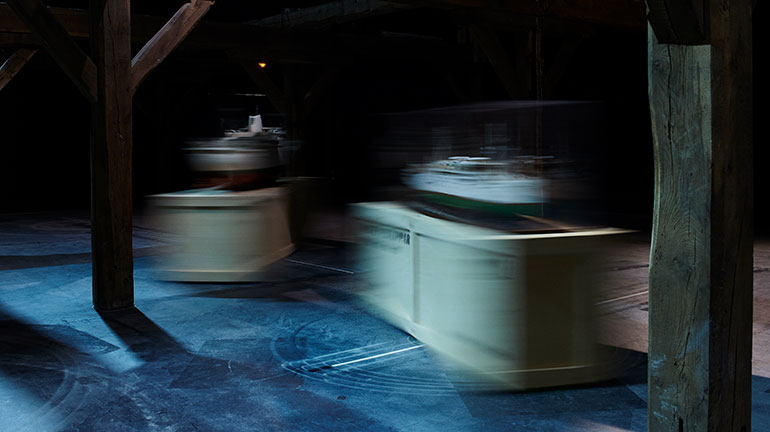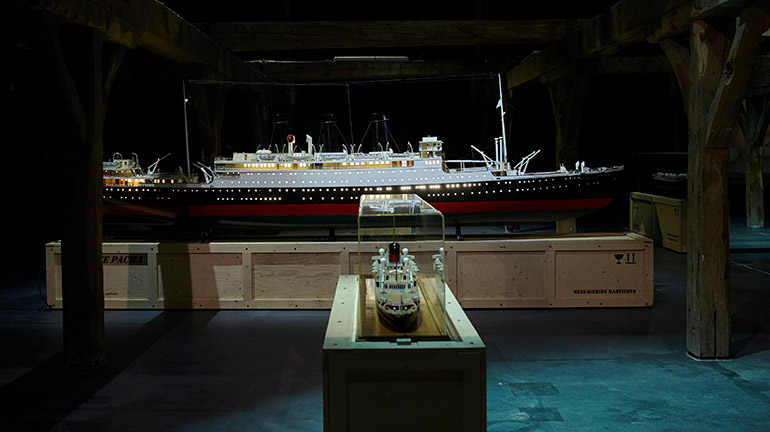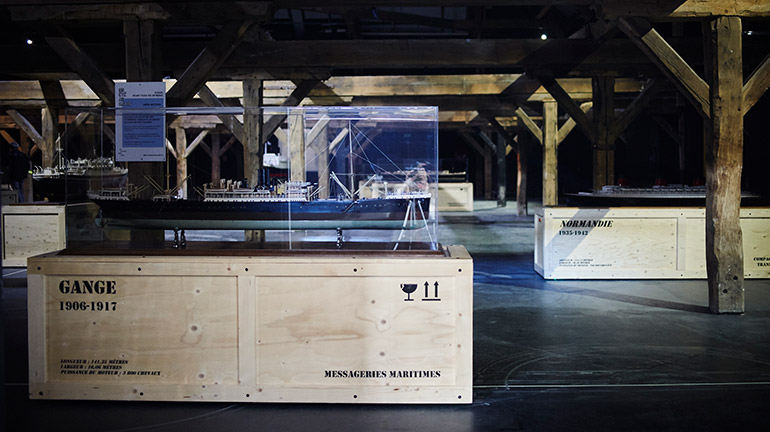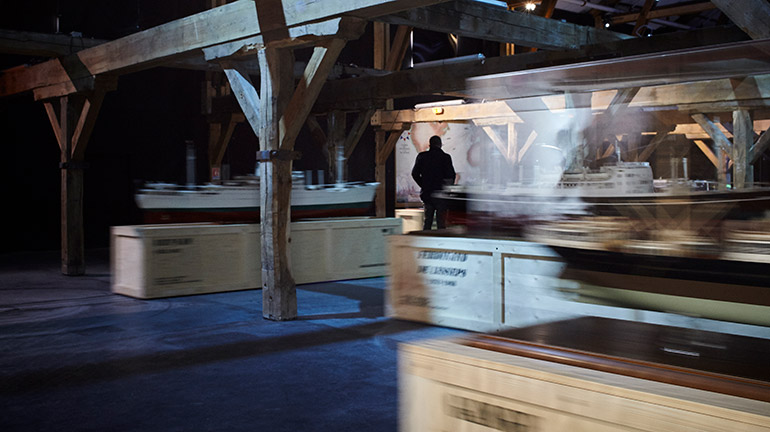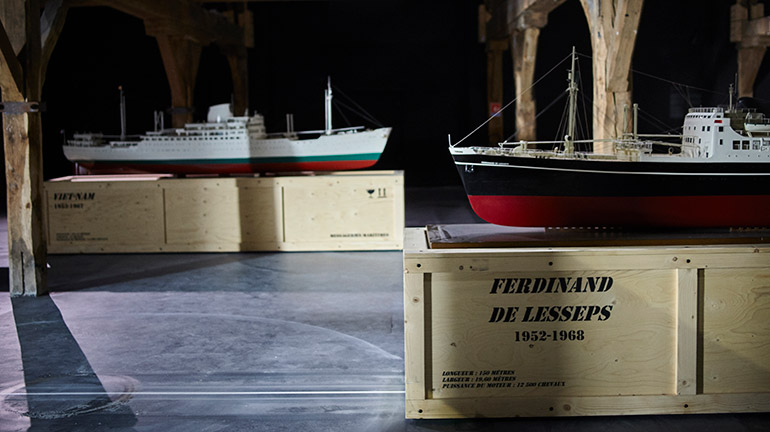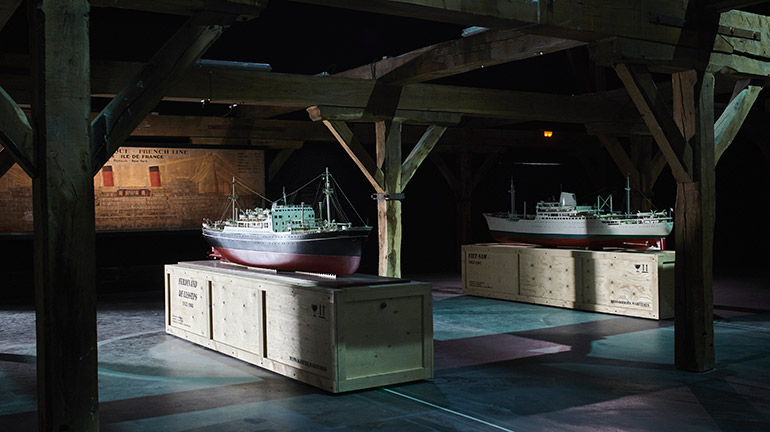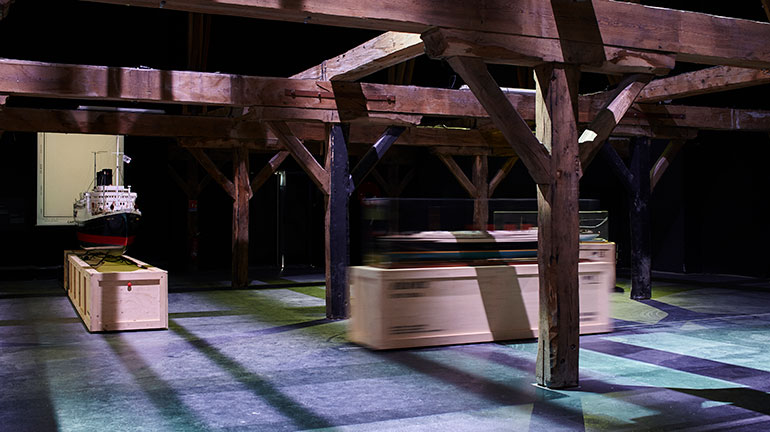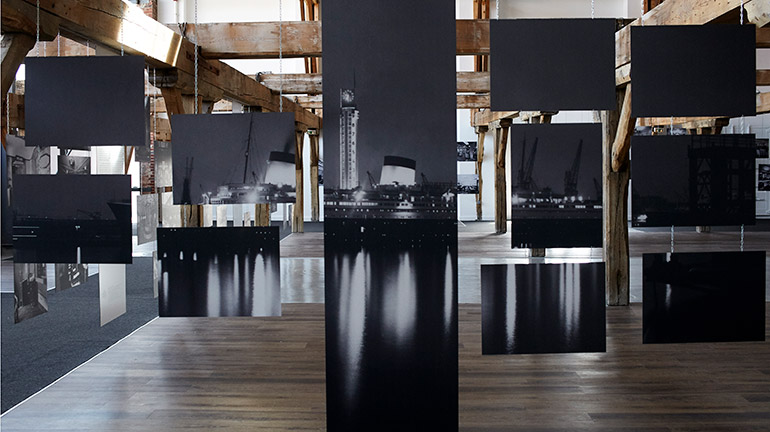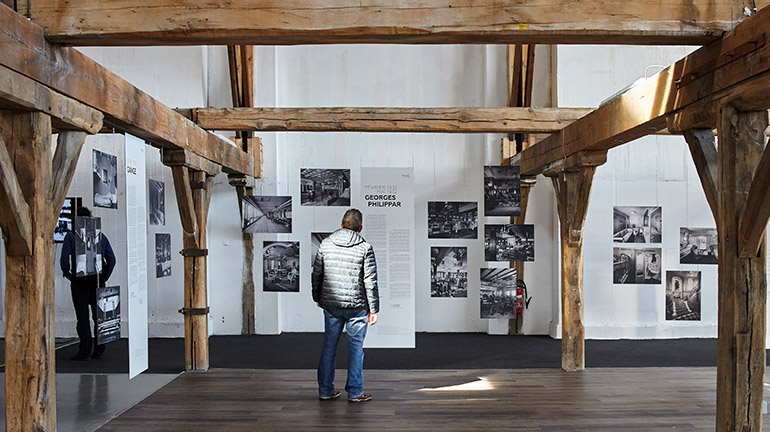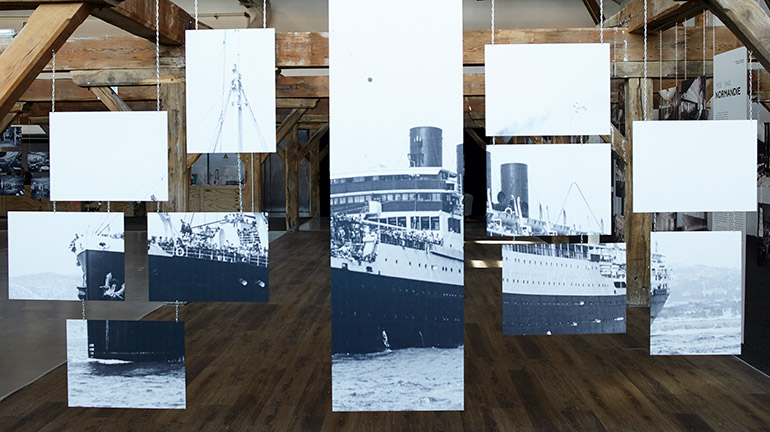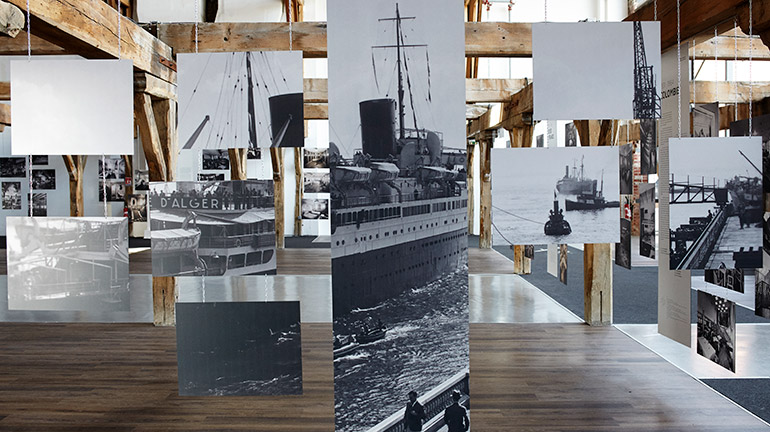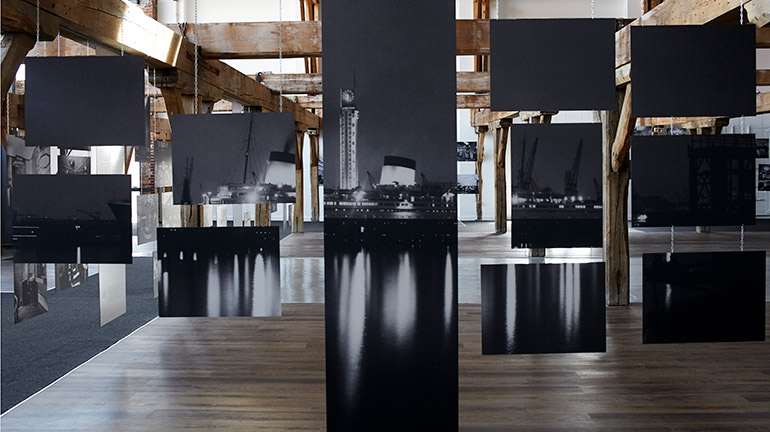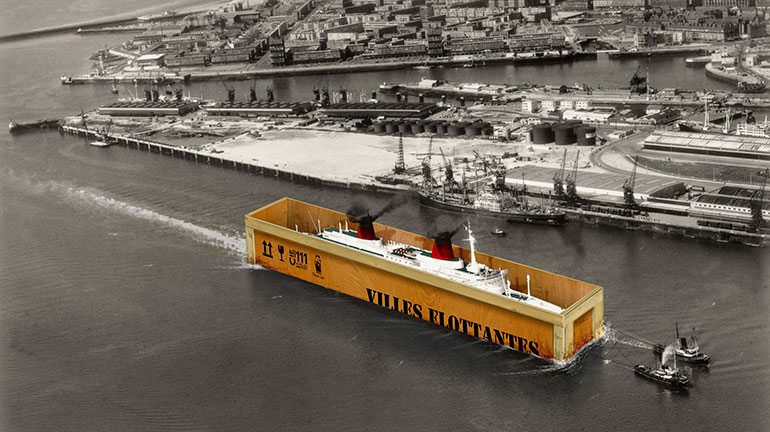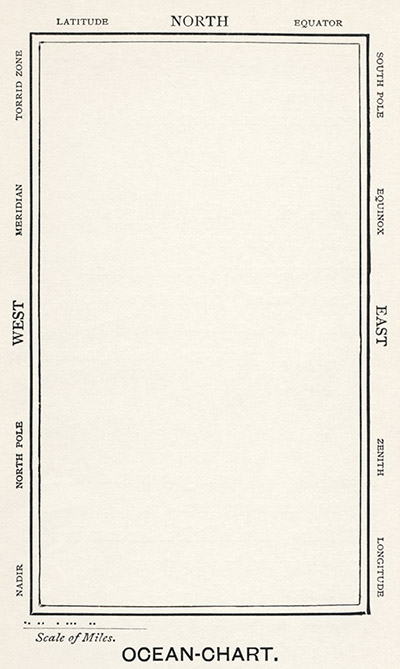de page
FLOATING CITIES
FLOATING CITIES
ANIMATED EXHIBITION
Île-de-France, Normandie, France, Ville d’Alger, Colombie, Ferdinand de Lesseps, Georges Philippar, Viet-Nam, Gange, Washington and Mariette Pacha are all names of legendary liners that echo in the memories of Le Havre. They were born proudly into light and luxury before disappearing forever, often in tragic ways, whether burnt down, scuttled, sunk, abandoned, sold or vandalised… The ships of French companies such as Compagnie Générale Transatlantique and Les Messageries Maritimes sailed across seas and oceans, transporting millions of men and women all over the world. Many traces remain of those giants of the oceans and of life on-board, including photographs, objects, documents and films, which the association French Lines has gathered together and preserved in Le Havre.
For this exhibition, whose title is taken from Jules Verne, I imagined that these huge vessels – the technological flagships of their time, now long gone – had made way for their scale models. These precious models, made using different technologies and in varying dimensions, were produced either by ship-owners prior to construction in the shipyard, or by the shipping companies as promotional items, or even by ship enthusiasts, as is the case of the Georges Phillippar model.
Removed from their boxes and brought together for the first time, the miniature liners sail across the Grenier des Docks [Docks attic] by way of an ocean. They plough their furrow, placed on their transport box, and trace out the thousands of return voyages of bygone maritime transport. Each model moves through the space in silent solitude. Imaginary lines criss-cross and mark out the space, highlighting the latitudes and longitudes that form the framework of maritime history, bringing back to life these floating cities, witnesses to a vanished world.
Aurélien Bory
Navigation technique
Each model is equipped with an inertial navigation unit which measures the course of its trajectory. The absolute positioning of each of the models is given by an ultrasound sensor (beacon) fixed to the frame, which determines its position by means of 16 fixed beacons distributed in space. The beacons on the models send their position by radio waves to a central computer which then checks their drift by reference to the initially programmed path. The computer pilots the models and corrects their progression by operating the two engines of each module. The models thus criss-cross the space, undulating around a straight line.
Thinking about
Map
There are similarities between this map and this attic. In the proportions, the grid, and the empty space that resonates with the place. The attic acts as a miniature ocean for the models. To cross it from side to side, they seem to follow an imaginary cartography, like this drawing by Lewis Carroll.
White space
The photographs of the interiors mostly served as publicity for the shipping companies, displayed in agencies, and published in guides and magazines. The sight of these spaces, devoid of any human presence, resonates differently today, now that those interior worlds have disappeared. The photographs bear the traces of what constituted a temporary habitat, a parenthesis in the life of millions of men and women, in very different situations, such as immigration, business, colonies, political and diplomatic relations. In many cases crossing the oceans was synonymous with hope. And fear of the crossing too, which the decoration, fittings and activities were designed to make people forget. The photographs recreate these spaces in fragments, like a puzzle which has to be reconstructed. And like memory, which always seeks the missing pieces.
distribution
Scénographie Aurélien Bory
Scénographe associé Lucas Thébault
Chef décorateur Pierre Dequivre
Assistant chef décorateur Thomas Dupeyron
Conception robotique Coline Feral
Création lumière Arno Veyrat
Sonorisation Joan Cambon, Stéphane Dardé
Construction décor Pierre Pailles, Morgan Nicolas, Pierre Masselot
Peinture décor Régis Friaud, Jean-Bernard Charpeill
Graphisme Muriel Goudol
Directrice des productions Florence Meurisse
Administration Clément Séguier-Faucher
Chargée de production Estelle Castagnoli
Presse Agence Plan Bey
Une commande de Jean Blaise à Aurélien Bory dans le cadre de l’événement « Un été au Havre 2017 » pour le 500ème anniversaire de la Ville du Havre et de son port. Scénographie d’exposition en partenariat avec l’association French Lines. Exposition réalisée sous le commissariat scientifique de Dorian Dallongeville, Directeur du patrimoine de French Lines.



